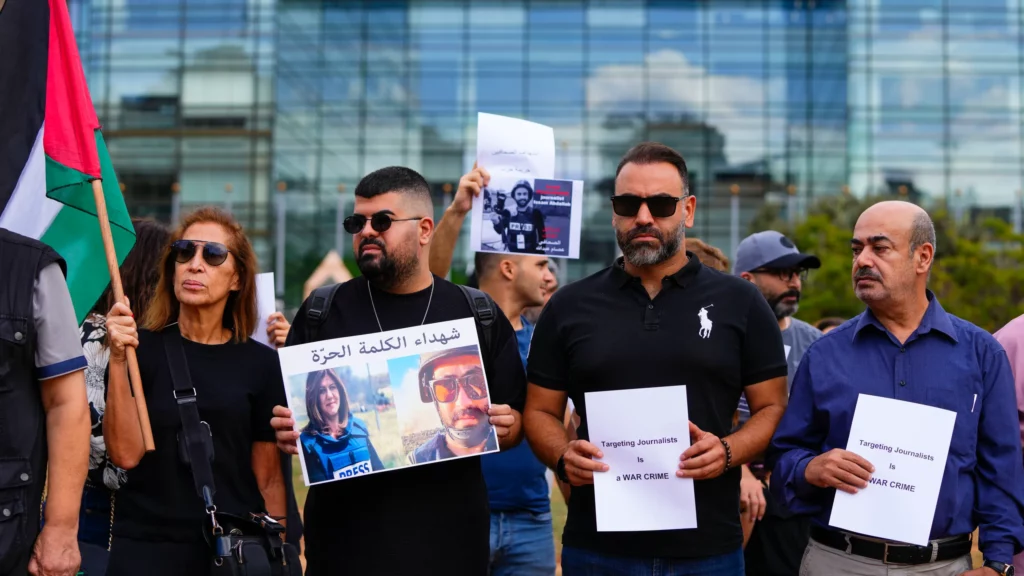Last week, the Samir Kassir Foundation released its annual report for 2023, titled “All Storms at a Time”, marking the passing of another year riddled with challenges to freedoms, democracy and human rights.
The report began with a brief discussion on the widescale massacre of journalists by Israeli forces, and the explicit targeting of media workers, before examining the nature and conditions surrounding journalistic work in the Levant for the year 2023.
Contents of the Report
The report begins with a prologue dedicated to “Freedom Icon” Gisèle Khoury, the founder and president of the organization, who died on 15 October 2023. Khoury was the wife of the late Samir Kassir, a prominent Lebanese-Palestinian journalist. Following her late husband’s death, Khoury launched the foundation as an organization to safeguard and defend the freedoms of journalists and ensure the continuity of independent media in the region.
The introduction of the report directly addresses the current massacres taking place against journalists covering realities in Gaza amidst deliberate Israeli targeting, while also addressing the weaponization of hate speech and disinformation in Lebanon by political groups such as Hezbollah.
After going through key milestones that SKF was involved in throughout the year, the report then addresses the state of freedom and journalist safety in the Levant region, based on each country.
Lebanon
The report begins with an examination of Lebanon, where a total of 100 violations were committed, including the killing three journalists by Israeli forces: Reuters visual journalist Issam Abdallah, Al-Mayadeen correspondent Farah Omar, and Al-Mayadeen cameraman Rabih Maamari.
Lebanese security services and political group supporters were also behind many violations, with both responsible for over 15 percent of the total count.
Palestine
In Palestine, a whopping 1130 violations were identified by the report, including the killing of 156 and a range of individualized targeting such as attacks against property, arrests, and detentions.
While Israeli forces or police and intelligence were responsible for the majority of violations, Palestinian private institutions also committed slightly over five percent.
Syria
In Syria, the situation is a bit more complex.
For the past 13 years, Syria has been in the throes of a civil war where a massive number of violations were committed against journalists and media workers. In 2023, numerous additional violations were also committed, with the report identifying 43 cases, including two killings, 15 arrests and 13 cases of physical assaults, committed by a variety of different parties including opposition forces, security services, the Syrian Army, Syrian Democratic Forces and others.
Jordan
Jordan, on its part, witnessed a smaller number of violations against journalists and media workers compared to its neighbors, with only 24 documented violations.
Information Manipulation
Afterwards, the report focused on the prevalence of information manipulation in Lebanon and the region, highlighting how traditional Lebanese media outlets “systematically and strategically contributed to exacerbating historical tensions and perpetuating socio-political divisions, forsaking fundamental values of the profession, undermining their contribution to enhanced accountability, and transforming journalism into merely another element in a larger political toolbox.”
This section also focuses on the use of cyber armies by groups such as Hezbollah and the Free Patriotic Movement on social media platforms, the manipulation of information and the fabrication of affiliations of political opponents, and the role that Whatsapp has played since the 2019 uprising.
The report then sheds light on the support for independent media and the threat to funding for media outlets documenting realities in Gaza by “the clear alignment of major donor governments with the Israeli narrative.”
On the other hand, it acknowledges the contributions of independent outlets in Gaza and the West Bank that have been functioning despite the escalating risk of losing further donor funding.
Finally, the report briefly mentions key events throughout 2023, including the 18th Edition of the Samir Kassir Award, and the 15th Edition of the Beirut Spring Festival.
It ends with an outlook on practicing a theory of necessary change, whereby SKF aims to expand its involvement in “the creation of an engaged public opinion” and invest “in fostering an enabling environment for a sustainable and well-developed independent media sector across the region through various avenues of support.”
